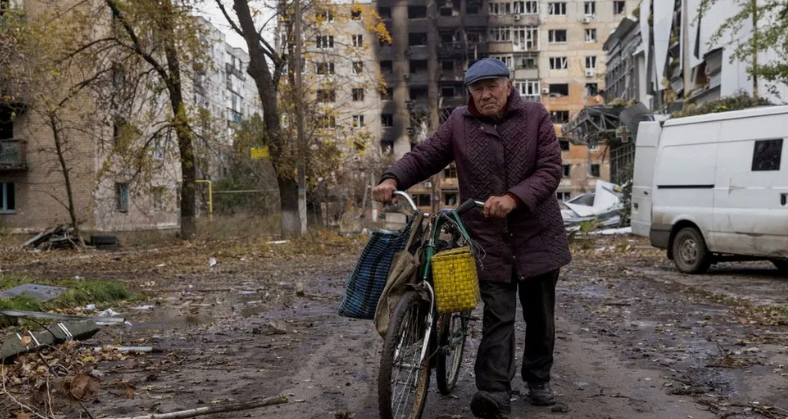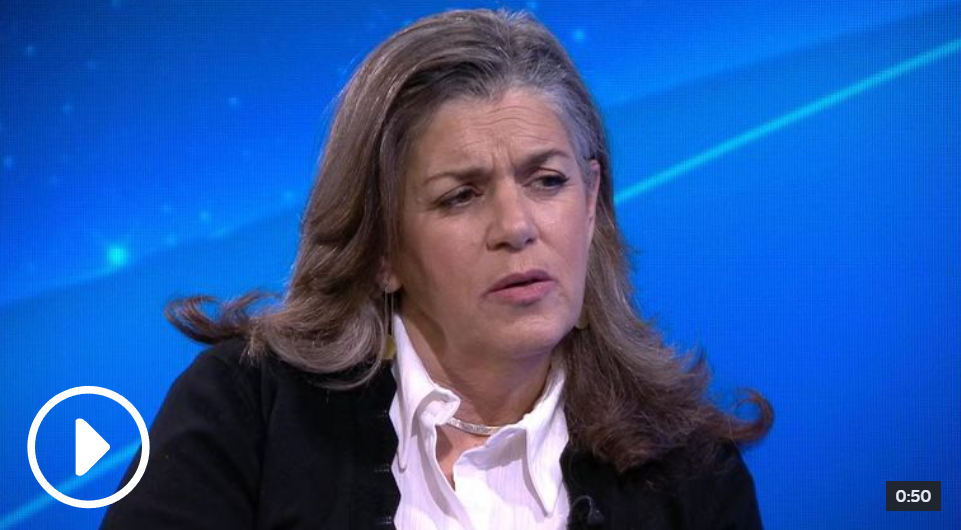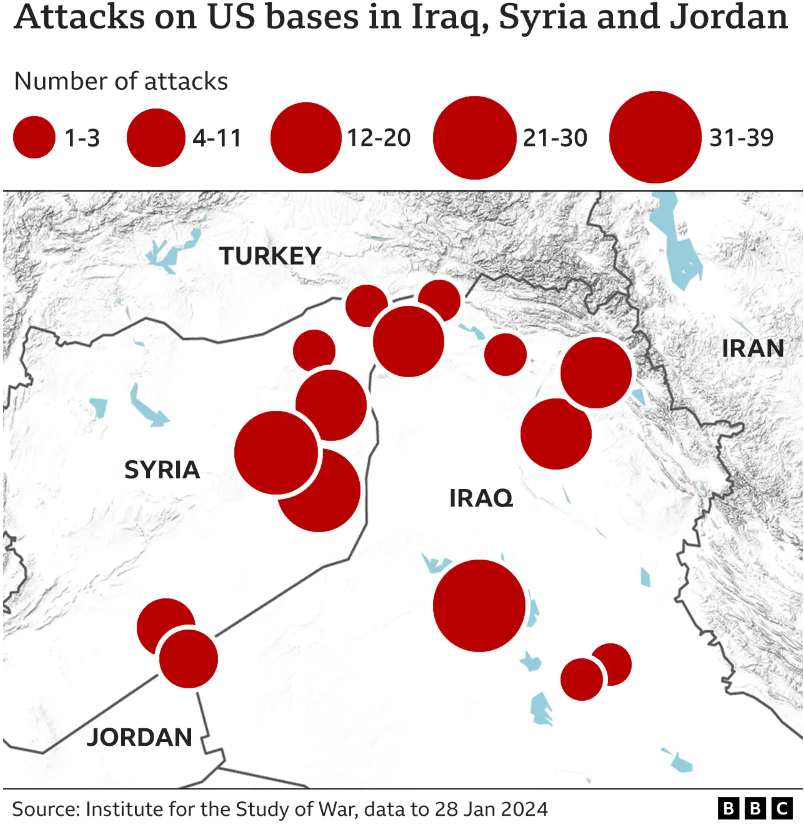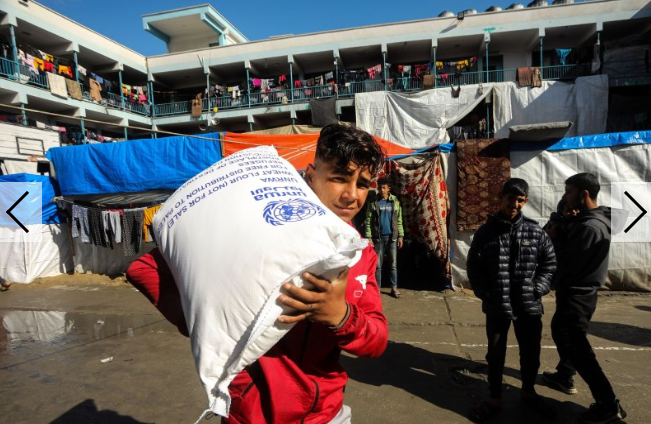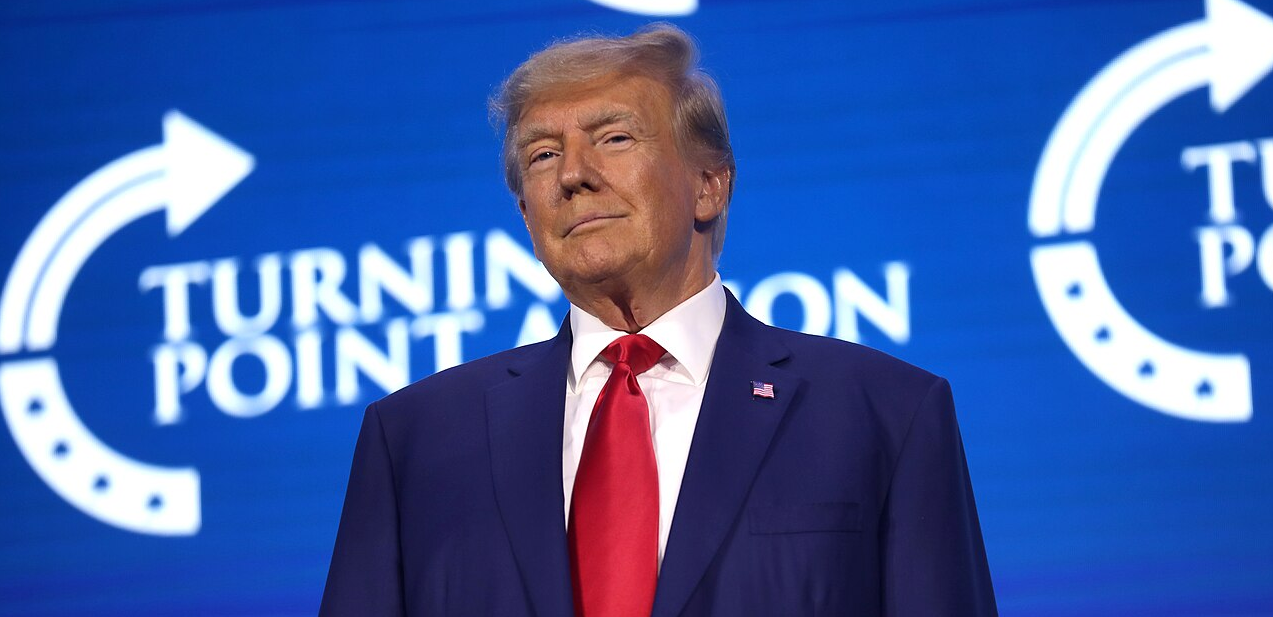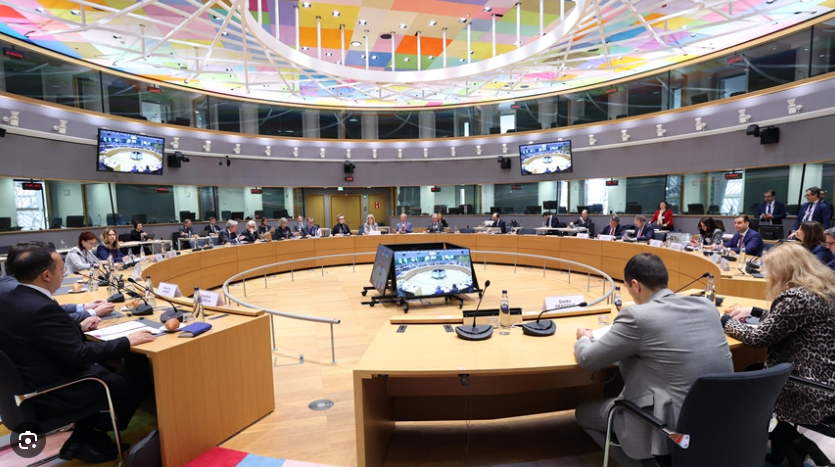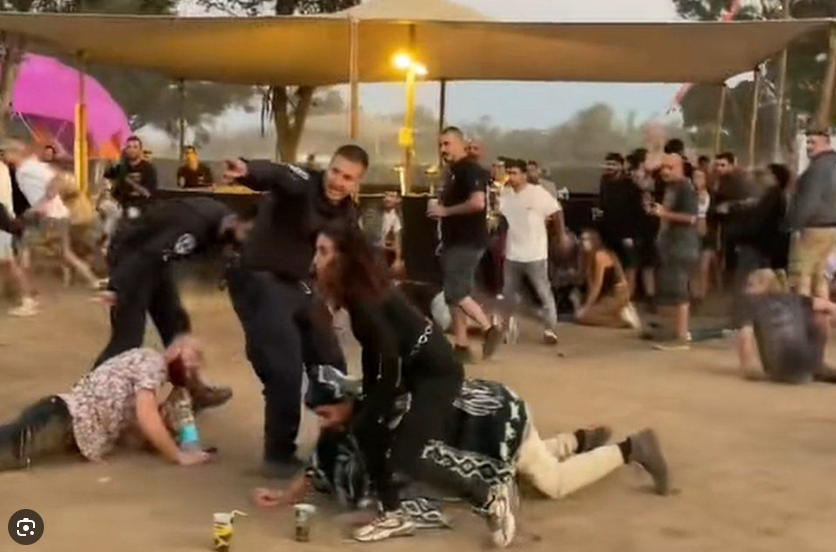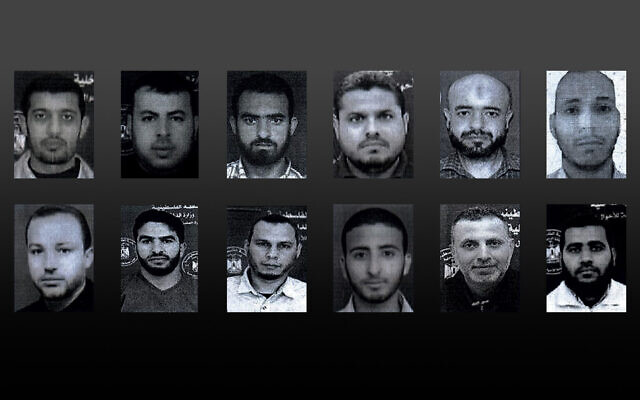-
Posts
10,051 -
Joined
-
Last visited
Content Type
Events
Forums
Downloads
Quizzes
Gallery
Blogs
Everything posted by Social Media
-
The ongoing conflict in the Middle East between Israel and Hamas has sparked heated debates and garnered significant media attention. However, one crucial aspect often overlooked is Hamas's genocidal objectives, which should be a central part of the narrative. While reporting on the conflict, mainstream media, including the BBC, has frequently failed to emphasize the fundamental difference between Israel and its enemies. Unlike territorial disputes, Hamas explicitly aims to kill Jews based on their identity, echoing the dark echoes of history, reminiscent of the Nazis' commitment to genocide. Hamas leaders have openly expressed their genocidal ambitions, leaving little room for interpretation. In 2018, Yahya Sinwar, the leader of Hamas in Gaza, declared, "We will take down the border (with Israel) and tear out their hearts from their bodies." The following year, another senior Hamas official, Fathi Hamad, shockingly proclaimed, "You have Jews everywhere, and we must attack every Jew on the globe by way of slaughter and killing." The gravity of Hamas's intentions became horrifyingly evident on October 7 when they turned words into actions, committing unspeakable atrocities. Reports emerged of burning Jewish families alive in their homes, beheading civilians, and using rape as a weapon of war. The brutality reached a point where a Hamas terrorist proudly called his parents, stating, "Look how many I killed with my own hands! Your son killed Jews!" Following this gruesome act, rather than condemnation, Hamas leaders celebrated their barbarism and called for its repetition. Sinwar chillingly proclaimed, "The leaders of the occupation should know. October 7 was just a rehearsal," while Ghazi Hamad, a member of the Hamas politburo, called for more attacks and the annihilation of Israel, stating, "We will do this again and again." The media's failure to consistently highlight this grim reality, especially by outlets like the BBC, raises concerns about the accuracy and balance of reporting on the conflict. Understanding Hamas's genocidal commitment is crucial in portraying Israel's defensive actions against a terrorist government determined to destroy the country and murder its Jewish citizens. As calls for a ceasefire and negotiations intensify, acknowledging the genocidal aims of Hamas must be a central focus. Israel, since its founding in 1948, has faced existential threats, with neighbors attempting invasions and enemies unwilling to accept the presence of Jewish people in their ancestral homeland. Any negotiations for a resolution must include two non-negotiable pre-conditions: Hamas renouncing its genocidal commitment to murdering Jews and accepting the existence of the State of Israel. The people of Israel's message is clear: peace becomes possible when the attempts to harm them cease. 95.01.24 Source
-
In a tragic incident in Jaywick Sands near Clacton-on-Sea, Essex, Esther Martin, a 68-year-old grandmother, was mauled to death by dogs during a visit to her 11-year-old grandson. The suspected XL Bully dogs involved in the attack were owned by Ashley Warren, a breeder and aspiring rapper known as Wyless Man. The dogs were destroyed by the police. Warren, who featured in online drill music videos, had previously advertised XL Bully puppies for sale on Facebook. The breeds involved in the attack are yet to be officially determined. Essex Police responded to the incident at around 4 pm and arrested a 39-year-old man from Jaywick on suspicion of dangerous dogs offences. Esther Martin's family claimed she had previously warned the dogs' owner about their dangerous nature. The family expressed their devastation, revealing that Esther had raised concerns about the breed and temperament of the XL Bully dogs. Sonia Martin, Esther's daughter, stated that the dogs were XL Bullies, with eight of them in the house, including six puppies and two adults. The family thanked neighbors who tried to help during the attack. The incident has left the family traumatized, especially Esther's 11-year-old grandson, who witnessed the violence. The attack occurred at 4 pm, but the family learned about Esther's death when the police visited her Chesterfield home at 10 pm. Sonia emphasized the distressing nature of the situation, stating that their nephew not only lost his mother and grandmother but also witnessed the violence. The police assured the public that there is no wider threat to the community, and the scene is now safe. Chief Superintendent Glen Pavelin acknowledged the shock to the community and assured ongoing police presence. The investigation is ongoing, and officers are appealing for information or footage related to the incident. The breeds involved will be officially confirmed by experts. Esther Martin's tragic death marks the first dog attack fatality in 2024, with 25 fatal dog attacks reported since 2020. The incident occurred shortly after new rules over the illegal XL Bully breed came into force, allowing police to seize unregistered dogs that do not comply with restrictions. Owners can face criminal charges and fines. The breed ban was implemented due to a series of attacks causing fatalities and injuries. The attack has raised concerns about the need for responsible dog ownership and adherence to regulations, with ongoing debates about breed-specific legislation. The tragedy in Jaywick Sands highlights the importance of public safety and proper enforcement of dog control measures. 05.02.24 Source
-
In a demonstration that drew over 10,000 participants, anti-Israel protesters marched through central London on Saturday, expressing various sentiments that ranged from calls for an immediate ceasefire to the Israel-Hamas conflict to pro-Houthi chants and displays of antisemitic conspiracy theories. The protesters, organized by the Palestine Solidarity Campaign (PSC), made their way through London’s West End to Whitehall, where speeches were delivered. Some called for an end to the conflict, but at Downing Street and near The Cenotaph, calls for intifada as the “only solution” were voiced. A few arrests were made during the demonstration, with one woman taken into custody for setting off a smoke bomb or flare, and another arrested for chanting slogans “that may incite racial hatred.” Various placards and banners exhibited controversial messages, including one claiming "the BBC is an arm of the Zionist propaganda machine" and another stating "Our media, TV, radio and government are controlled by Zionists." Some posters equated Zionism with Nazism, while others depicted UK and American leaders as Adolf Hitler. Support for Yemen’s Houthis, who have recently attacked international shipping, was evident throughout the march. A cardboard poster with the words "keep the world clean" alongside an illustration of an Israeli flag in a bin was also part of the visual expressions during the event. Organizers cited it as the "eighth national march held for the Palestinian people" since the October 7, 2023 massacre in which Hamas terrorists murdered 1,200 Israelis and kidnapped around 240 individuals, half of whom remain in captivity. The Metropolitan Police had deployed hundreds of officers, some with additional dispersal powers, for the march. Leading up to the event, the police warned that they would take action against anyone who "crossed the line." Earlier in the week, the Met denied a request from organizers to have a second stage, emphasizing the need to balance protesters' rights with the rights of others, given the significant disruption caused by the march. Notably, two Labour MPs, Apsana Begum and Zarah Sultana, spoke at the protest, and several trade unions, including the NEU, RMT, and UCU, were also represented. 05.02.24 Source ‘Disgraceful’: Pro-Palestine protest in London facing backlash
-
In a move indicative of ongoing disputes over US migration policy, the US House is set to vote next week on a standalone $17.6 billion aid package for Israel, excluding any funds for Ukraine. Speaker Mike Johnson cited the urgent need to provide aid to Israel in its conflict with Hamas in the Gaza Strip as the reason for the separate vote, asserting that there isn't sufficient time to consider a comprehensive package that combines aid for Ukraine and Israel alongside US-Mexico border security provisions. This standalone Israel aid bill signals a delay in addressing Ukraine aid, highlighting internal disagreements within the House GOP over migration policy. Aid for Israel has garnered more support within the House GOP compared to assistance for Ukraine. The proposed bill encompasses funds for Israel's Iron Dome and Iron Beam missile defense systems, allocations for US military operations in the Middle East, and enhanced protection for US personnel at embassies. Unlike a $14 billion Israel aid bill that previously passed the House amid Democratic objections, this bill won't include offsetting spending cuts. Speaker Johnson, in a letter to colleagues, emphasized the urgency of providing critical support to Israel, stating, "Given the Senate’s failure to move appropriate legislation in a timely fashion, and the perilous circumstances currently facing Israel, the House will continue to lead." The bill aims to address US military funding needs arising from increased operations in the Middle East following the October 7 Hamas attack on Israel and subsequent Israeli military actions in the Gaza Strip. The proposed funds include $3.3 billion for the US response to regional activities and $200 million for the protection and evacuation of US personnel. As the Pentagon operates under a stopgap funding measure, the proposed bill is crucial for meeting the financial demands of the military buildup in the region. Representative Ken Calvert of California, the bill's author, highlighted the additional funding for US military activities compared to the previous November bill. Notably, the original House bill proposed funding for Israel by cutting Internal Revenue Service tax enforcement funding. However, Democrats argued that this move would widen the US budget deficit due to potential revenue losses from increased tax evasion. The ongoing dispute over US migration policy has further complicated the legislative process, with Speaker Johnson dismissing a reported bipartisan border-security deal as "dead on arrival" in the House. The deal, granting new powers to swiftly deport migrants, was intended to be attached to the Ukraine and Israel aid package and is scheduled for a procedural vote in the Senate on Wednesday. The absence of House involvement in negotiations has hindered swift consideration of any resulting legislation, according to Johnson. 05.02.24 Source
-
In a coordinated effort, the United States and the United Kingdom have conducted airstrikes on Houthi targets in Yemen, deploying air and surface platforms, including fighter jets, and receiving support from several other nations. The strikes targeted at least 30 locations across 10 different areas, focusing on command and control centers, underground weapons storage facilities, and weaponry used by the Houthis to threaten international shipping lanes. The joint statement issued by the US and UK, along with Australia, Bahrain, Canada, Denmark, the Netherlands, and New Zealand, emphasized the commitment to de-escalate tensions and restore stability in the Red Sea. The action serves as a response to ongoing Houthi attacks on international shipping lanes and US warships in the region. The strikes in Yemen come on the heels of the US-led operations in Iraq and Syria, undertaken in retaliation for a drone attack that claimed the lives of three US service members and injured many more. The Biden administration's multi-tiered response aims to avoid direct confrontation with Iran while targeting some of its powerful proxies in the region. By addressing Iran's influential proxies, the US aims to convey a message indirectly to Tehran, signaling repercussions for its support of militant organizations. US Defense Secretary Lloyd Austin emphasized that the strikes in Yemen aim to disrupt and degrade the capabilities of the Houthi militia, emphasizing the consequences they will face if they persist in illegal attacks on international shipping and naval vessels. President Joe Biden approved the Yemen strikes earlier in the week, emphasizing a commitment to defending lives and ensuring the free flow of commerce in critical waterways. The recent strikes in Yemen mark the third joint operation by the US and UK in response to Houthi aggression. The previous attacks targeted weapons storage facilities and radar sites, attempting to impede the rebel group's ability to threaten international shipping lanes in the Red Sea and the Gulf of Aden. Despite earlier strikes, the Houthis have remained defiant, vowing to confront what they perceive as aggression from the US and UK. As the Biden administration continues its response, the strikes in Yemen underscore a strategic effort to address threats emanating from Iran-backed groups in the Middle East, demonstrating a commitment to maintaining regional stability and safeguarding international waters. 04.02.24 Source
-
The International Court of Justice (ICJ), the United Nations' top court, has declared that it possesses jurisdiction to hear the case brought by Ukraine against Russia. Filed at The Hague just days after Russia's full-scale invasion of Ukraine in February 2022, Kyiv accuses Moscow of unjustly invoking genocide law to justify its brutal invasion. Ukraine's case at the ICJ contends that Russia falsely used the Genocide Convention of 1948 to legitimize its actions in the ongoing conflict. Russia, on the other hand, argues that its intervention was aimed at preventing a genocidal attack on ethnic Russians in Ukraine's eastern Donbas region. While the focus of the case revolves around the Genocide Convention, Ukraine does not accuse Russia of committing genocide within its borders. Instead, Kyiv asserts that Russia violated the genocide treaty by using it as a pretext for the invasion. Ukraine maintains that there was no credible risk of genocide in the eastern regions, where it had been engaged in conflict with Russian-backed forces since 2014. Ukrainian representative Anton Korynevych welcomed the ICJ's decision, emphasizing the importance of the court ruling on the allegation that Ukraine is not responsible for a purported genocide that Russia has falsely claimed since 2014 in Donbas. The ICJ's ruling grants it jurisdiction to consider Ukraine's request for a declaration that Kyiv has not committed genocide. However, the court will not rule on whether Russia's invasion or recognition of the independence of areas in eastern Ukraine amounts to a violation of the Genocide Convention, as those claims fall under different international laws. Russia contends that Ukraine is using the case as a means to indirectly challenge the overall legality of its military action and has sought to have the case dismissed. A record 32 states have submitted their views on the matter, with more than two dozen European states, Australia, and Canada formally supporting Kyiv. This recent procedural development signifies a significant step forward in the case, allowing it to proceed. While ICJ rulings are legally binding, the court lacks the authority to enforce them, making diplomatic and international pressure crucial in determining the outcome of this high-stakes legal dispute. 03.02.24 Source
-
Former CIA officer Joshua Schulte has been sentenced to 40 years in prison for his role in leaking classified hacking tools to WikiLeaks and possessing child abuse images. The sentencing comes after Schulte was found guilty of the charges at three separate federal trials in New York in 2020, 2022, and 2023. Schulte, 35, was accused of leaking the CIA's "Vault 7" tools, a collection enabling intelligence officers to hack smartphones and use them as listening devices. The leak, described by prosecutors as one of the most "brazen" in US history, involved sharing 8,761 documents with WikiLeaks in 2017, constituting the largest data breach in the CIA's history. Despite denying the allegations, Schulte was convicted on various counts, including espionage, computer hacking, contempt of court, making false statements to the FBI, and possession of child abuse images. US Attorney Damian Williams stated, "Joshua Schulte betrayed his country by committing some of the most brazen, heinous crimes of espionage in American history." Evidence presented during the trial revealed that Schulte worked as a software developer in the Center for Cyber Intelligence, engaged in cyber espionage against terrorist organizations and foreign governments. Motivated by workplace disputes and anger, he transmitted stolen information to WikiLeaks in 2016, causing significant damage to national security, according to prosecutors. The leak immediately compromised the CIA's ability to gather foreign intelligence, putting personnel, programs, and assets at risk and costing the agency hundreds of millions of dollars. WikiLeaks began publishing classified data from the files in 2017, further amplifying the impact of Schulte's actions. During the investigation, the FBI found Schulte had lied to agents about his involvement. Subsequent searches of his apartment uncovered tens of thousands of images of child sexual abuse materials. Even after his arrest in 2018, Schulte attempted to transmit more information from jail, smuggling in a phone and trying to send a reporter details about CIA cyber groups. The sentencing marks the culmination of a high-profile case that exposed the extent of Schulte's betrayal, resulting in severe consequences for both national security and his personal freedom. 03.02.24 Source
-
In response to a devastating suicide drone strike that claimed the lives of three American soldiers in Jordan, the U.S. military has executed a series of air and missile strikes against Iranian proxies in Iraq and Syria, marking a significant escalation in tensions. The strikes, comprising over 125 precision munitions, targeted more than 85 locations, including command centers, intelligence hubs, missile facilities, and logistical supply chains used by militia groups and Iran's Revolutionary Guard Corps (IRGC). The retaliation comes after the deadly January 28th attack on a remote base in Jordan, which resulted in the highest death toll of U.S. troops in the Middle East in over a decade. President Biden, who visited Dover Air Force Base to receive the bodies of the fallen soldiers, stated that the U.S. response had begun and would continue at times and places of its choosing, emphasizing that the nation does not seek conflict but will respond to harm against Americans. The U.S. strikes were carefully chosen to avoid civilian casualties, with seven facilities linked to IRGC and its proxies hit in Iraq and Syria. The Iraqi government was informed before the strikes, and targets were selected based on their role in facilitating attacks against U.S. and coalition forces. The severity of the response indicates a departure from previous limited actions, reflecting the gravity of the January attack. President Biden had telegraphed the strikes in advance, signaling a decisive response to the escalating threats posed by Iranian-backed militias. National Security spokesman John Kirby hinted that these initial strikes might be part of a broader, tiered approach, suggesting multiple actions over time. The retaliatory measures have sparked debates about the next steps, with some advocating for a robust and continuous response. Retired Adm. James Stavridis has called for continuous strikes against proxy targets in Syria and Yemen, urging the U.S. to prepare for a significant cyber attack on Iran's infrastructure. While the U.S. has faced ongoing attacks from Iranian-backed militias in the region, the recent strikes indicate a shift from merely deterring these groups to actively degrading their power. Analysts point out various potential targets, including Iranian Revolutionary Guard bases in Syria and Iranian naval assets, but caution against escalating the conflict into a regional war. As the situation unfolds, the evolving mission for U.S. troops in Iraq and Syria comes under scrutiny. Initially deployed to combat ISIS, the troops have found themselves entangled in a complex web of regional tensions. With the latest strikes, the Biden administration aims to reestablish deterrence and protect American interests in the region. The coming weeks will likely witness diplomatic efforts alongside potential military actions as the U.S. navigates this precarious geopolitical landscape. 03.02.24 Source
-
Topic Updates: Women's genitals 'systemically mutilated' in Hamas attack, says Israeli reservist who dealt with bodies She told Sky News' The World With Yalda Hakim she was at the Shura base on 8 October, where victims were brought the day after the attack that killed more than 1,200 people. "Women were shot many times in the face... Their mouths were in grimaces, their eyes were open, their fists were clenched," she said "They were shot so many times in the head, in many cases it was like there was purposeful obliteration of women's faces. "Our team has seen women shot in the crotch, in the genitals. Women were shot in the breast... Our team saw this." She added: "Women had legs cut off. It seemed like there was a systematic genital mutilation of women in the women we saw." Hamas has denied its fighters raped anyone during the attack, saying it would contradict Islamic teaching, but the UN has begun investigating the claims. Read More https://news.sky.com/story/womens-genitals-systemically-mutilated-in-hamas-attack-says-israeli-reservist-who-dealt-with-bodies-13060959 Israelis tell British MPs of evidence of Hamas sexual violence Many of the MPs and members of the House of Lords who attended Wednesday's meeting in Parliament were in tears as they listened to the testimony of the Israelis. "Many women arrived with bloody, shredded underwear, many arrived with no clothing," she said. "Our team commander saw several female soldiers who were shot in the vagina, the crotch or they were shot in the breast. This was gratuitous. This was a deliberate, systematic, genital mutilation." Ms Mendes said her identification unit had seen bodies decapitated or with limbs cut off. "I'm here to be their voice," she said. Read More https://www.bbc.com/news/uk-68162920
-
The United States, reeling from a drone attack on its military base in Jordan that claimed the lives of three soldiers, has reportedly approved plans for retaliatory strikes against Iranian targets in Syria and Iraq. This escalating situation raises concerns of a wider conflict in the region, despite US assurances of seeking a measured response. The Trigger: On Sunday, a drone attack attributed to an Iranian-backed militia group struck a base in Jordan, housing US troops. This resulted in the tragic deaths of three American soldiers and injuries to 41 others. The US blames the Islamic Resistance in Iraq, a network of militias bolstered by Iran, for the attack. Planned Retaliation: US officials, while not disclosing exact timelines, have confirmed the approval of strikes against Iranian facilities and personnel in Syria and Iraq. These strikes represent a direct response to the Jordan attack and are intended to deter future aggression. However, weather conditions are likely to influence the timing of the operation, with the US prioritizing good visibility to minimize civilian casualties. Escalating Tensions: The planned strikes come amidst escalating tensions in the region. US President Joe Biden faces mounting pressure from Republican lawmakers to take decisive action against Iran, while simultaneously emphasizing his aversion to a wider war. This balancing act reflects the complex geopolitical landscape, where a misstep could lead to unintended consequences. Key Players and Motivations: US: Driven by the need to hold perpetrators accountable and protect its interests, the US seeks a response that sends a clear message without igniting a broader conflict. Iran: While denying involvement in the Jordan attack, Iran faces internal pressure from hardliners pushing for retaliation against US presence in the region. Iran-backed Militias: Operating in Syria and Iraq, these groups pose a direct threat to US forces and contribute to regional instability. Potential Impact: The planned strikes, while limited in scope, could still trigger further attacks and escalate tensions. Regional stability hangs in the balance, and the international community awaits the US response with trepidation. Looking Ahead: The coming days will be crucial in determining the trajectory of the situation. Whether the US strikes achieve their intended effect without provoking further escalation remains to be seen. Continued diplomatic efforts and clear communication are essential to prevent the conflict from spiraling out of control. 02.02.24 Source
-
Fulton County District Attorney Fani Willis finds herself at the center of a legal storm surrounding her investigation into alleged election interference by Donald Trump and his associates. Michael Roman, one of the individuals indicted alongside Trump, has subpoenaed Willis and special prosecutor Nathan Wade to testify at a hearing next month. Roman alleges an improper romantic relationship between the two prosecutors, claiming it creates a conflict of interest and warrants Willis's disqualification from the case. Roman's accusations center around financial arrangements and personal interactions between Willis and Wade. He claims Wade received an excessive sum from the DA's office and vacationed with Willis, suggesting potential bias and undue influence. Willis vehemently denies these allegations, maintaining Wade's "impeccable credentials" and asserting transparency in their professional relationship. This development adds another layer of complexity to the already intricate investigation. Trump has joined Roman's efforts to dismiss the indictment and remove Willis and her team from the case. Meanwhile, the judge overseeing the proceedings has granted Willis's office until early February to respond to the allegations. Several uncertainties cloud the immediate future. Whether Willis and Wade will testify at the upcoming hearing remains to be seen. The potential impact of these accusations on the investigation's trajectory is also unclear. Ultimately, the judge's decision on Roman's motion to dismiss the charges and disqualify Willis will hold significant weight in determining the case's course. It's crucial to remember that these are merely allegations, and their veracity has yet to be established. As the legal proceedings unfold, it's important to stay informed through reliable sources and avoid drawing definitive conclusions based on unproven claims. 02.02.24 Source
-
A new poll by Quinnipiac University shows President Biden pulling ahead of former President Trump in a hypothetical 2024 matchup, with a growing gender gap emerging in voter preferences. Key Findings: Biden leads Trump 50% to 44%: This marks a 6-point shift in Biden's favor since December, when the race was too close to call. Independents favor Biden: 52% of independents support Biden, compared to 40% for Trump. Gender gap widens: 58% of women support Biden, up from 53% in December, while 53% of men support Trump, largely unchanged. Haley challenges Biden: In a separate hypothetical, Nikki Haley leads Biden 47% to 42%. Analysis: Biden's lead: While encouraging for the incumbent, it's still early in the election cycle and much can change. Gender gap: The widening gap in female support could be crucial, as women make up a larger voting bloc than men. Haley's potential: While leading Biden head-to-head, Haley's numbers drop when third-party candidates are included. Additional Notes: The poll was conducted among 1,650 registered voters nationwide and has a margin of error of +/- 2.4%. South Carolina's Democratic primary takes place this weekend, followed by Nevada's Republican primary and South Carolina's Republican primary in late February. Overall, this poll suggests Biden has gained some momentum heading into the 2024 election, but the race remains competitive and the gender gap could be a significant factor. 02.02.24 Source
- 296 replies
-
- 15
-

-

-

-

-
The United Nations Relief and Works Agency for Palestine Refugees (UNRWA) faces a potential collapse of its vital humanitarian operations in Gaza due to funding suspensions following allegations of employee involvement in Hamas attacks. Despite this, UN Secretary-General Antonio Guterres calls for continued support. Key Points: Allegations: Around 12 UNRWA employees were accused of involvement in an October attack on Israel, prompting funding pauses from major donors like the US. Humanitarian Crisis: Gaza's 2.2 million residents, 85% displaced, face dire conditions with food insecurity and lack of basic supplies. Guterres' Appeal: He urged member states to resume funding, emphasizing UNRWA's critical role as the "backbone" of humanitarian aid in Gaza. NGO Warning: 28 organizations, including Oxfam and Save the Children, warn of a "complete collapse" of humanitarian response if funding isn't restored. Supporters and Concerns: While the EU and some others advocate for UNRWA's role, they express concern about the allegations and seek clarification. Death Toll: Gaza's health ministry run by Hamas reports nearly 26,900 deaths and 66,000 injuries due to the ongoing conflict. Hamas does not distinguish between combatant deaths and civilian deaths. Uncertainties: Will major donors like the US resume funding UNRWA? How will the alleged employee involvement be addressed? Will the humanitarian crisis in Gaza worsen without UNRWA's operations? Outlook: The funding suspension creates a critical situation for Gaza's population and throws UNRWA's future into uncertainty. Resolving the allegations and securing continued funding are crucial to prevent a further humanitarian disaster. 02.02.24 Source
-
A London high court judge has dismissed Donald Trump's lawsuit against Orbis Business Intelligence, the company that compiled the infamous "Steele dossier" containing allegations of Russian interference in the 2016 US presidential election. Key Points: Claim Dismissed: Judge Steyn ruled that Trump's claim for damages over data protection breaches was filed outside the six-year time limit. No Trial: The court won't examine the dossier's accuracy or inaccuracy, as the case focused solely on legal procedures. Remedies Ineffective: Even if Trump won, deleting the dossier wouldn't be feasible as it's widely available online. Trump May Appeal: Despite the setback, Trump could still appeal the decision. Background: The dossier compiled by Christopher Steele, a former British intelligence officer, alleged Russian attempts to influence the election and contained unverified claims about Trump's personal conduct in Russia. Trump sued Orbis, seeking damages and claiming the dossier violated his data protection rights. He offered to testify in court to disprove the allegations. Court's Reasoning: The judge ruled that Trump should have filed the lawsuit within six years of the alleged data breach, which didn't happen. Even if he won, it wouldn't achieve his goal of removing the dossier online, as it's already widely accessible. Implications: The dismissal is a setback for Trump and could affect his legal strategy regarding the dossier. However, it doesn't address the truthfulness of the dossier's claims, which remain a topic of debate. 02.02.24 Source
-
All 27 EU leaders have finally reached an agreement on a €50 billion aid package for Ukraine, overcoming previous objections from Hungary. This significant development follows months of negotiations and demonstrates a renewed commitment from the European Union to support Ukraine in its ongoing struggle against Russia. Key Points: The package will provide crucial financial assistance to Ukraine over the next four years, aiming to cover essential expenses like pensions, salaries, and other government costs. This agreement comes at a critical time as Ukraine awaits approval of military aid from the US Congress, currently on hold. Notably, Hungarian Prime Minister Viktor Orbán, previously an obstacle to the deal, agreed to the new terms, which include yearly discussions and a potential review after two years. Ukrainian President Volodymyr Zelensky expressed gratitude for the united support from the EU, emphasizing the package's role in strengthening Ukraine's long-term economic and financial stability. Additional Information: The €50 billion package highlights Europe's unwavering commitment to Ukraine's security and its broader vision of upholding the international order in the face of Russian aggression. This latest development follows the EU's decision to open accession talks with Ukraine in December, another significant step towards closer ties. While concerns remain regarding Hungary's internal issues, this agreement showcases the EU's collective strength and ability to overcome internal divisions when faced with major challenges. Overall, the €50 billion aid package serves as a powerful message of solidarity and support for Ukraine from the European Union. It marks a crucial step in ensuring the country's long-term stability and resilience in the face of ongoing conflict. 02.02.24 Source
-
Topic Updates: UNRWA must make ‘fundamental changes’ before funding can resume, US says The US envoy to the United Nations said on Tuesday that Washington needs to see “fundamental changes” before its suspended funding to UNRWA can resume following Israeli allegations that some agency staff were involved in the October 7 attack by Palestinian terrorist group Hamas. Linda Thomas-Greenfield, the US Ambassador to the UN, welcomed the organization’s decision to conduct an investigation and review of the United Nations Relief and Works Agency for Palestine Refugees in the Near East. The US was not alone in freezing funding following Israeli accusations as a cascade of countries did the same, including the UK, Germany and Japan. Source House Foreign Affairs Committee (HFAC) hearing, called to examine UNRWA’s failures. https://foreignaffairs.house.gov/hearing/unrwa-exposed-examining-the-agencys-mission-and-failures/ @IMPACT_SE's CEO Marcus Sheff during yesterday's Congress hearing on UNRWA: 'Jihadi educational materials are created on a large institutional level.' @UNRWA doesn't have just a few bad apples; the whole batch is corrupt.
-
A bill recently approved by the Florida House Select Committee on Health Innovation has sparked outrage and concern among transgender rights advocates and allies. The bill, if passed, would require driver's licenses in the state to display the licensee's sex assigned at birth rather than their gender identity. This policy change has been met with widespread criticism, with opponents arguing that it would out transgender people, endanger their safety, and violate their basic human rights. A Needless Intrusion on Personal Identity Opponents of the bill point out that requiring driver's licenses to display sex assigned at birth does not serve any legitimate purpose. Driver's licenses are already used for identification purposes, and there is no evidence that transgender people are more likely to commit fraud than anyone else. In fact, many transgender people already have their gender identity reflected on their driver's licenses, and there have been no reported issues with this practice. Increased Risk of Discrimination and Violence Critics argue that the real purpose of the bill is to discriminate against transgender people and make their lives more difficult. By forcing transgender people to display their sex assigned at birth on their driver's licenses, the bill would make it easier for them to be outed and discriminated against. This could lead to increased harassment, violence, and even job loss. Violation of Basic Human Rights Many legal experts argue that the bill violates the privacy rights and equal protection rights of transgender people. They point out that the bill is based on the false premise that gender identity is not real, and that it singles out transgender people for unfair treatment. The Fight for Equality Continues Transgender rights advocates and allies are vowing to fight the bill every step of the way. They are planning protests, lobbying efforts, and legal challenges. They are also urging Floridians to contact their state representatives and senators and urge them to vote against the bill. The Importance of Transgender Rights The fight for transgender rights is part of a larger struggle for equality and justice for all. Transgender people deserve to be treated with dignity and respect, and they should have the same rights as everyone else. The Florida bill is a dangerous and discriminatory measure that should be defeated. The bill is part of a larger trend of anti-transgender legislation that has been sweeping across the country in recent months. 01.02.24 Source
-
The United Kingdom is projected to experience a significant population surge in the coming years, with net migration driving the majority of the growth. This demographic shift has ignited a debate about its potential impact on infrastructure, public services, and social cohesion. Numbers at the Heart of the Discussion: The Office for National Statistics (ONS) forecasts a 9.9% population increase by 2036, reaching 73.7 million. Notably, net migration is expected to contribute 92% of this growth, equating to roughly 6.1 million additional residents. This translates to an influx roughly equivalent to "five Birminghams," according to critics. Concerns and Calls for Action: This projected demographic shift has raised concerns about potential strains on public services like healthcare, education, and housing. Additionally, some voices express anxieties about cultural integration and social cohesion. Politicians like Suella Braverman and Robert Jenrick have called for stricter immigration controls to manage the situation. Government Measures and Commitments: The government has acknowledged the need for action. Home Secretary James Cleverly recently announced visa restrictions for foreign care workers, aiming to curb migration in specific sectors. Chancellor Rishi Sunak reiterated the government's commitment to reducing overall immigration levels. However, critics argue these measures might not be sufficient to address the projected growth. Beyond Challenges, Opportunities Emerge: While concerns are valid, it's crucial to consider the potential benefits of a diverse and growing population. Immigration can bring cultural richness, economic dynamism, and innovation. Open and informed discussions are needed to ensure that policies foster integration and maximize the opportunities presented by this demographic shift. Moving Forward: A Balanced Approach: Addressing the UK's population boom requires a multifaceted approach. Investing in infrastructure and public services is crucial to accommodate the growing population. Effective integration policies can help ensure that newcomers contribute positively to society. Additionally, transparent and constructive dialogue is essential to address concerns and anxieties around immigration, promoting social cohesion and understanding. 01.01.24 Source
-
In response to ongoing attacks by Iranian-backed Houthi rebels in the Red Sea, the UK is exploring the possibility of sending an aircraft carrier to the region, according to Armed Forces Minister James Heappey. Concerns and Potential Deployment: Currently, the US aircraft carrier USS Dwight D. Eisenhower (nicknamed "Ike") is stationed in the Red Sea to deter further attacks against Israel and prevent escalation of the conflict. However, the possibility of the "Ike" returning to America raises concerns about a potential "gap" in regional security. Heappey suggests the UK's HMS Queen Elizabeth or HMS Prince of Wales could be deployed to "plug this gap" if needed. Current UK Involvement: The UK has already been involved in the conflict, launching airstrikes against Houthi targets alongside the US. Additionally, the warship HMS Diamond patrols the Red Sea to protect vital shipping lanes. Key Considerations: The potential deployment of a UK aircraft carrier highlights the UK's commitment to regional security and its willingness to collaborate with allies like the US. It also brings questions about the long-term sustainability of UK involvement in the conflict and the potential escalation of tensions with Iran. Additional Information: The recent drone strike on a US base in Jordan, attributed to Iran-backed militias, further complicates the situation and intensifies regional anxieties. Chancellor Rishi Sunak has urged Iran to de-escalate tensions, reflecting international concerns about the potential for wider conflict. Overall, the potential deployment of a UK aircraft carrier to the Red Sea signifies a critical juncture in the ongoing conflict. It remains to be seen whether this move will contribute to de-escalation or further inflame regional tensions. 01.01.24 Source
-
French President Emmanuel Macron delivered a strong message to Europe on January 30th, urging the continent to step up and support Ukraine independently, even if the United States withdraws its aid. This call comes amidst growing concerns about the reliability of US support and the potential for escalating conflict in Eastern Europe. Europe at a Crossroads: In a speech given in Sweden, Macron declared, "This is a decisive and testing moment for Europe." He emphasized the need for the EU to be ready to act alone, stating, "We must be ready to defend and support Ukraine whatever it takes and whatever America decides." Uncertain US Commitment: The current US administration's commitment to Ukraine's defense has been thrown into question. Republican lawmakers have held $61 billion in aid hostage, demanding unrelated policy changes. Further uncertainty arises from the possibility of former President Trump regaining power in 2024. Time for Europe to Lead: Macron argued that Europe cannot rely solely on the US for its security and future relations with Russia. "Europe had been lucky to have America as a partner," he acknowledged, "but we have to be lucid." He urged the EU to take "bold decisions" to support Ukraine, regardless of American actions. EU Aid Package on the Horizon: Macron's speech comes just before a crucial European Council summit on February 1st, where member nations will discuss a €50 billion aid package for Ukraine. This aid package was previously blocked by Hungary, but recent negotiations offer hope for its approval. The Cost of Inaction: Macron warned against the dangers of allowing Russia to prevail in Ukraine. "The real cost to us of a Russian victory in the short and long run is too high for all of us," he asserted. He echoed concerns shared by NATO officials and European leaders about the potential for conflict to spill beyond Ukraine's borders. Strengthening European Defense: Macron called for a robust European response, urging increased defense production and a more proactive approach to continental security. He emphasized the need for Europe to take charge of its own security architecture, independent of US-Russia decisions on arms control. A Turning Point for Europe: Macron's speech marks a significant moment in European history. It highlights the continent's growing assertiveness and its determination to shape its own destiny, even in the face of an uncertain global landscape. Whether Europe can effectively unite and act decisively in support of Ukraine remains to be seen, but Macron's words have undeniably served as a powerful call to action. 01.01.24 Source
-
‘There were at least 30 bodies that were burned alive" EXCLUSIVE 'I was in charge of gathering the bodies after the Nova Festival massacre... they were still smouldering 12 hours later': Israeli official gives devastating account of sickening scene after the Oct 7 Hamas terror attack that plunged the world into crisis. As the commander of the special units at ZAKA, he was in charge of coordinating the response to the deadly attacks, and ensuring that all the bodies were accounted for and treated properly as soon as possible. But the brutality with which Hamas had killed more than 360 innocent partygoers at the Nova Festival shocked even him, a volunteer who had been working for ZAKA since he was just 18 years old. Haim, who spoke to MailOnline through a translator, said: ‘There were at least 30 bodies that were burned alive. ‘Many needed to have water poured on them because they were still burning 12 hours after because of the fuel they used to set them on fire. Their bodies were soaking with this fuel that [caused them to burn for a long time].’ Hamas didn’t just use fire as a weapon of war against partygoers at the festival. Sexual violence was used to humiliate the victims at the site, many of whom were young women. He said: 'When I go back to the memories, I remember lots of bodies were mutilated to pieces. ‘Organs were separated from their bodies, women had been shot in their very private areas, the upper parts of their legs, their heads. ‘Women were undressed and then they were shot. ‘I saw [stab wounds] in very specific areas on women, around their genitals.’ 1.02.24 Source The Wall Street Journal Video
-
French lawmakers have taken a significant step towards permanently enshrining abortion rights in the nation's constitution. This move comes in the wake of the US Supreme Court's decision to overturn Roe v. Wade and amid growing concerns about abortion access in Europe. Overwhelming Support in Lower House: On Tuesday, the National Assembly, France's lower house, overwhelmingly voted in favor of the bill with 493 votes for and 30 against. This strong support reflects the broad acceptance of abortion rights in France, which were legalized in 1975. Motivation Beyond Immediate Threat: While abortion access currently faces no direct threat in France, President Macron and advocates pushed for the legislation as a proactive measure. They cite the US Supreme Court's decision as a stark reminder of the vulnerability of abortion rights, even in established democracies. Additionally, growing anti-abortion movements in countries like Poland and Italy raise concerns about a potential spillover effect. The Proposed Change: The proposed amendment seeks to add a new line to the constitution stating that "the law determines the conditions under which a woman's guaranteed freedom to have a voluntary interruption of pregnancy is exercised." This explicitly incorporates abortion rights as a fundamental right and not just a legislative matter. Next Steps and Potential Hurdles: The bill now heads to the Senate, where the process could become more challenging. Right-wing lawmakers there expressed reservations about the wording of the proposal, specifically the use of "freedom" instead of "right." Finding common ground between the two houses will be crucial for the bill's progress. Uncertain Final Outcome: Even if both houses agree on a version of the proposal, further hurdles remain. It requires approval by either a supermajority of both houses or a national referendum, with unpredictable results. Historic Move with Global Implications: The French initiative holds significant symbolic weight, showcasing a strong commitment to safeguarding abortion rights. Its outcome will be closely watched internationally, potentially influencing similar efforts in other countries grappling with this sensitive issue. 01.02.24 Source
-
- 1
-

-
Topic Update: Blinken says evidence of UNRWA staffers’ Oct. 7 involvement ‘highly, highly credible’ News outlets publish photos of UN staffers implicated in Israeli dossier; New Zealand pauses funding over ‘incredibly serious’ allegations; Israel cancels meetings with UNRWA head. The evidence provided by Israel alleging that roughly a dozen UNRWA staffers participated in Hamas’s October 7 terror onslaught is “highly credible,” US Secretary of State Antony Blinken said Monday, as media outlets published additional details on the implicated employees, including photos from an Israeli dossier. “We haven’t had the ability to investigate [the allegations] ourselves. But they are highly, highly credible,” Blinken said during a press conference. Blinken stressed that the UN agency for Palestinian refugees plays an “indispensable” role in providing assistance to civilians in the Gaza Strip and that “no one else can play the role that UNRWA has been playing, certainly not in the near term.” Channel 12 reported that one of the 12 men implicated was an UNRWA teacher accused of being armed with an anti-tank missile, while another teacher had been accused of filming a hostage being taken captive during the onslaught. Another of the staffers, also an elementary school teacher, allegedly served as a Hamas commander and participated in the massacre in Kibbutz Be’eri, while a man employed by UNRWA as a social worker was allegedly involved in the kidnapping of an IDF soldier’s body on that day. “The allegations are incredibly serious. It’s important they are properly understood and investigated,” New Zealand Prime Minister Christopher Luxon told reporters on Monday when he announced Wellington would not “be making any further contributions” to UNRWA. Asked whether the US will consider resuming funding to the agency after the administration announced a suspension on Friday, Kirby said it would depend on the results of UNRWA’s investigation. “We understand that [UNRWA is] very dependent on donor contributions, and the United States has been a leading donor for many years… All the more reason that this investigation needs to be credible, transparent, thorough and timely,” he said. Read More https://www.timesofisrael.com/blinken-says-evidence-of-unrwa-staffers-oct-7-involvement-highly-highly-credible/
-
Full Transcript Last week I travelled from Israel, a country where they want to eradicate every last Hamas terrorist, to Qatar, where they gave Hamas’s political leaders a home. In Turkey, I met up with President Erdogan. While he praised the South Africans for accusing Israel of genocide, I think their case is unjustified. Despite this, I finished the week believing that, with the right steps, we could see an end to the fighting and even the start of a viable solution to the Israel/Palestine question. Why? How? Israel and the Palestinians seem as far apart as ever. After the horrors of October 7, even liberally minded Israelis find it hard to stomach the idea of a two-state solution. And, of course, many Palestinians have been further brutalised by what has happened during more than 100 days of fighting. Yet, underneath, both sides can see that the past 30 years have been a colossal failure. For all the growth of Israel’s economy, rising living standards and investment in military might and physical barriers, they don’t have the one thing every country and every family yearns for: security. And for all the actions of the Palestinians – whether taking the peaceful path and campaigning for recognition, or the violent one and attacking Israel – they have not achieved the dignity of statehood. And in the current conflict, both sides can see that it isn’t leading where they want. So there is – just possibly – a narrow pathway ahead. It must start with an immediate pause in the fighting. This could allow vital aid to get in to Gaza, where people are starving and disease is spreading. And it could see the negotiations to free the hostages succeed. We should all abhor the idea of trading guilty prisoners to bring back these innocent people. But impossible times make for unpleasant deals – and that’s what needs to happen. Next we need to turn a fragile truce into a sustainable, permanent ceasefire without a return to more fighting. More than that: can we at the same time kick-start a process that could lead to something much bigger – a lasting solution? In fact, the 2 things – ceasefire and solution – are closely linked. These are the vital steps. We have to see the key Hamas leaders leave Gaza. Israel has permitted safe passage for terrorists in the past – and the people responsible for October 7 have to go. We have to see the instruments of terrorism still in Gaza being dismantled. In the carnage of the past 100-plus days of conflict, it often goes unreported that Hamas rocket attacks against Israel have continued. And Hamas still wants to launch terrorist atrocities again. It must be put beyond doubt that this cannot happen. These steps would give Israel some of the reassurance it needs to end its military campaign. But the Palestinian people need reassurance too. We must give the people of the West Bank and Gaza the political perspective of a credible route to a Palestinian state and a new future. And it needs to be irreversible. This is not entirely in our gift. But Britain and our partners can help by confirming our commitment to a sovereign, viable Palestinian state, and our vision for its composition. And, crucially, we must state our clear intention to grant it recognition, including at the United Nations. The Palestinian leadership must help as well, by forming a new government which can immediately start to deliver. There is now a younger generation of Palestinians. They share their leader President Abbas’s dedication to realising a Palestinian state. But they know it is going to need a technocratic, modern administration that can win the confidence of people in Gaza, the West Bank and the wider Muslim and Arab world. All these things are intricately linked because you can’t get one without all the others. Arab and other allies in the region won’t help guarantee the end of Hamas terrorism or back a new Palestinian authority unless they see a clear pathway to a state called Palestine. Israel won’t forswear renewed hostilities unless Hamas are finished in Gaza. And Palestinians won’t believe life will really be different unless they are governed by other Palestinians and see a long-term future. There will be many other elements to add to such a plan: The promise of normalised relations between Israel and countries such as Saudi Arabia, whose influence is growing across the region and the world; Genuine security guarantees for Israel and restrictions on what a future Palestinian state can do in terms of security and alliances; A programme to end radicalised education programmes that teach children to hate those of a different faith; A massive international effort to rebuild Gaza and make the most of its pivotal location and brilliant people. Naturally, there will be differences of opinion about the right order of these steps and to extent to which they must be completed and by when. That’s why we are pressing for a Contact Group that brings together the US, UK, key EU states, Gulf and Arab countries and Turkey to be set up at once. In all of this the aim must be clear. Let’s use a pause in the fighting to build unstoppable momentum towards a lasting solution. It’s only when the prize on offer from peace is more attractive than the potential benefit of continued conflict that we will have the chance of a better future. And the time to start is now. Original Speech Source
-
Elon Musk's brain-computer interface (BCI) company, Neuralink, has achieved a significant milestone with the successful implantation of its wireless chip in a human patient. This marks the first time such technology has been deployed in this way, raising hopes for potential advancements in various fields, like communication and treatment of neurological conditions. Key Points: Implant Success: Initial results show promising detection of neuron activity, and the patient is recovering well. Purpose: Connecting human brains to computers and addressing complex neurological issues. Testing Phase: A six-year study involving surgical placement of 64 thin threads in the brain's "movement intention" area for recording and transmitting brain signals wirelessly. First Product: "Telepathy" aims to enable device control solely through thought, initially targeting individuals with limb paralysis. Competitors: Rival companies like Blackrock Neurotech and Precision Neuroscience also developing BCI technology, some with longer track records. Challenges: Ethical concerns and potential safety risks require careful consideration. What's Next? While exciting, Neuralink's progress raises critical questions. Ethical considerations about privacy and potential mind control require open discussions. Additionally, long-term safety and efficacy of the technology need thorough evaluation. Furthermore, Neuralink faces competition from established players like Blackrock Neurotech and Precision Neuroscience, each with distinct approaches and advantages. Regardless, this breakthrough marks a significant step in the BCI field, holding immense potential for improving lives and pushing the boundaries of human-computer interaction. The coming years will undoubtedly be crucial in determining the ethical and practical implications of this technology. 31.01.24 Source




















